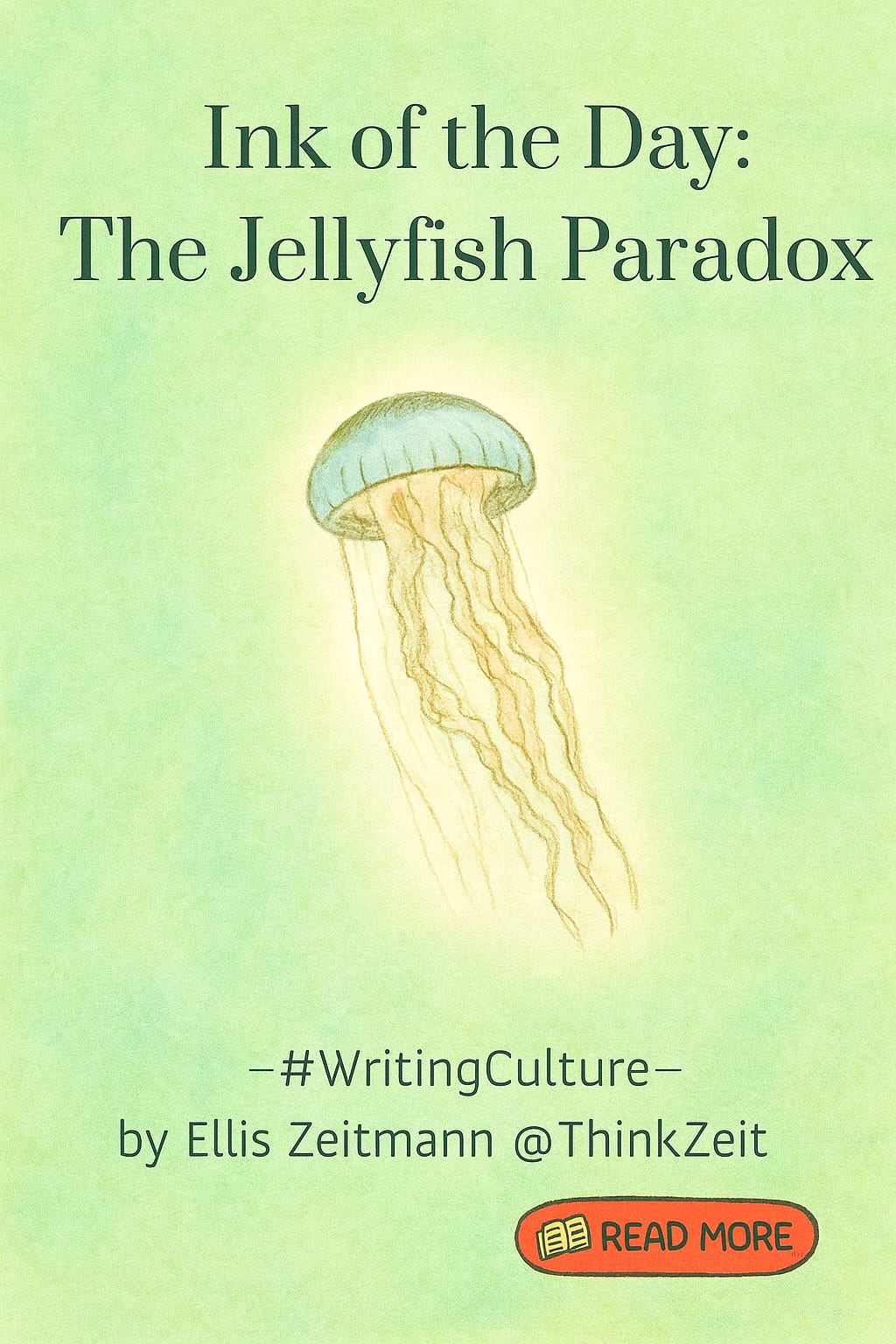Ink of the Day Deep Reflection: The Jellyfish Paradox #WritingCulture
What if survival didn't require thought, only rhythm?
✒️ Imagine a creature that has outlived dinosaurs, witnessed the rise and fall of empires, and drifted through 650 million years of history without a brain, a heart, or even a plan. The jellyfish, with its translucent form and hypnotic pulse, endures not through intellect or innovation, but by harmonizing with the ancient rhythms of the ocean.
In a world obsessed with progress and cleverness, the jellyfish offers a quiet paradox: survival without striving, continuity without cognition.
A Master of Harmony
Drifting without bone, without blood, without brain, the jellyfish has no central nervous system. No plans. No ideologies. No fear.
And yet, it endures.
For over 650 million years, it has glided through prehistoric seas, watching from below as dinosaurs thundered, empires rose and fell, and modern civilization blinked into being. It does not rush. It does not resist. It pulses in tune with a rhythm older than speech.
It's easy, from the surface, to mistake simplicity for absence. But survival of this kind is not accidental. It's a mastery of harmony, an attunement to the invisible breath of the planet rather than its noise. Perhaps it is not despite the jellyfish's lack of a brain that it has endured, but because of it.
A Myth Carried in Silence
If the jellyfish belonged to mythology, it would not be the roaring gods of Olympus but the ancient ones of the sea. Pontus, the primordial father of marine life, or Nereus, the old man who knew all things yet never lied.
The jellyfish floats as if it remembers what humans have forgotten: that to live does not require conquest, and to last does not demand understanding.
The Psychoanalytic Drift
The jellyfish lives in a state before striving. It exists in what Freud called the oceanic feeling, a sense of boundless unity with the world before the infant becomes a self, separated from the mother, from the world. The jellyfish, never having split, remains in that ancient embrace.
The Holding Waters: A Winnicottian View
Donald Winnicott might see in the jellyfish a creature perpetually held by its environment. His concept of the "holding environment," the physical and psychological space where an infant experiences safety and continuity of being, finds its perfect embodiment in the jellyfish's relationship with the ocean.
Unlike humans, who must eventually separate from their holding environments and create internal structures to replace what was once provided externally, the jellyfish never leaves its primary holding space.
The jellyfish exists in what Winnicott would call going-on-being, a state of uninterrupted continuity that precedes the development of a separate self. It pulses in a rhythm that is both its own and inseparable from the current that carries it. There is no differentiation between inner and outer worlds, no painful transition from dependence to independence.
Perhaps this is why we gaze at jellyfish in aquariums with such fascination. They remind us of our earliest experiences of being held, before we knew ourselves as distinct from the world. They embody a state of unbroken trust in the environment, a trust humans strive to recover through what Winnicott called "transitional objects" and "transitional experiences" that help bridge our inner and outer realities.
Before the Split: Klein's Pre-Ambivalent Position
Melanie Klein, with her focus on primitive anxieties and defensive mechanisms, would recognize in the jellyfish a being that exists before the paranoid-schizoid position, the psychological state where infants split their experiences into good and bad, protective and persecutory.
Without a brain to process separation anxiety or abandonment fear, the jellyfish never needs to employ the splitting defenses that Klein identified as fundamental to human psychological development. It floats in a pre-ambivalent state, never having to integrate conflicting feelings toward the same object.
The jellyfish's tentacles both capture prey and protect its formless body, but these functions are not split conceptually as they would be in human psychology. There is no moral categorization, only the ceaseless integration of being and doing, receiving and repelling.
The jellyfish represents not just pre-cognitive existence but pre-psychological existence, a state before the internal objects that populate human mental life have been established. It is existence without the fundamental splitting that Klein believed was necessary for human mental development but also the source of our deepest conflicts.
✦ A Gentle Invitation
Perhaps we envy the jellyfish not because it has no brain, but because it carries no burden of thought. No self to maintain. No story to uphold.
As we rush toward progress, toward cleverness, toward cognitive dominance, a question lingers like salt in the air: Is it intellect that ensures survival, or intimacy with the elemental rhythms of being?
⁂ What's Next?
What does the jellyfish teach us about our own lives? Could we, even briefly, let go of striving and reconnect with the rhythms of being?
Share your thoughts in the comments below or reflect on a moment when you felt truly in harmony with your environment. Let's explore together what it means to live with less resistance and more flow.
—#WritingCulture— by Ellis Zeitmann for ThinkZeit
#InkOfTheDay #DeepReflections #WritingCulture #PhilosophyOfLife #Psychoanalysis #BiologicalWisdom #MythologyAndMeaning #ExistentialThinking #CreativeWriting #LeadershipThroughReflection #NarrativeIdentity #PoeticThinking



